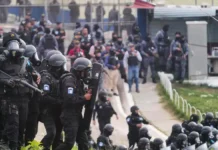Greece is grappling with five raging wildfires as a blistering heatwave grips the country, pushing temperatures up to 44°C (111.2°F) and testing emergency services to their limit. Authorities warn that Sunday remains “extremely dangerous” as searing heat and high winds fuel the risk of new blazes.
Two of the fiercest fires are tearing through the islands of Kythira and Evia, with the fire brigade staging all-night battles to contain them. Despite some progress, fire service spokesperson Vasilios Vathrakoyannis cautioned that conditions remain volatile:
“We fought all night, but today is still extremely dangerous.”
On Kythira, a fire that ignited in the village of Pitsinades quickly engulfed surrounding areas. Residents in Venetianika and Pitsinades were told to evacuate toward Livadi, as helicopters and water bombers attempted to douse the flames. Locals described scenes of “total destruction.”
Meanwhile, in Evia, a blaze near Pissona spiralled out of control on Saturday, sending six firefighters to hospital and cutting power to multiple villages. Authorities said conditions slightly improved by Sunday morning, though gusty winds threaten to undo any gains.
Messinia in the southern Peloponnese also faced a fast-moving fire in Trifylia, where homes and farmland were damaged. Over 100 firefighters are now on the ground.
The capital region of Attica wasn’t spared. A fire that began in Afidnes quickly spread through Drosopigi, Kryoneri, and Agios Stefanos, forcing evacuations. Though the main front is now contained, hotspots continue to burn, with smoke reaching central Athens.
In Crete, a 20-kilometre firefront scorched forests, farmland, beehives and livestock in Chania. Strong southwesterly winds and power outages have complicated containment efforts.
Last month’s fire on Chios destroyed over 11,000 acres, and earlier this July, 5,000 tourists were evacuated from Crete due to fires.
Greece has now formally requested EU Civil Protection Mechanism assistance for six additional firefighting aircraft.
Neighbouring Turkey is also under siege. A blistering 50.5°C (122.9°F) was recorded Saturday in Silopi, smashing national records. Fires have raged for four days in Karabuk and claimed 10 lives in Eskisehir. Water restrictions have been imposed in tourist hubs like Cesme.
With climate extremes intensifying and heat-driven wildfires spreading faster than ever, the Eastern Mediterranean faces one of its most punishing summers in recent memory.



















